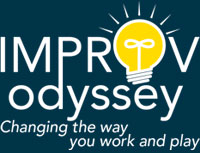Living in Our Head: Connected yet Disconnected by Technology
As individuals we are isolated from one another, full of limitations, fears, tensions, competitiveness, prejudices, and preconceived attitudes. If our openness is more than just a hope, a sentiment, a word, certain conditions must be met. The first of these we would call mutuality or trust. True playing will produce trust. – Viola Spolin –.. read more →
The Paradox of Side-Coaching
Solving my “Shut-Off” “My work is not Psychodrama!! Never use your own tears! Use the character’s tears!” Viola proclaimed this very emphatically when we would try to work out our personal problems in a scene. Some actors in our workshop were trained to use ‘sense memory’ and transfer the sadness of a personal event.. read more →
IMPROV and the ROI
“Bottom line, how will Improv increase our sales, improve our morale, or our team? What guarantees do we have that everyone is going to benefit from this training? What can we expect to see after your work with us is over? Will we be a more productive workforce? Can we measure that? Will our staff.. read more →
Just Be Yourself
We ape, we mimic, we mock. We act. — Laurence Olivier Have you ever walked into an interview or an audition and the interviewer, in an effort to relax you, tells you “just be yourself”? And rather than helping you, you only get more butterflies in your stomach? Your mind races. “What does that mean.. read more →
Story, story…LIVE!
The game of Building a Story is a staple with improv groups around the world. It is the essence of collaboration by building a story one word at a time and by sharing ideas using give and take and intense listening. Invariably, the challenge wakes you up and your focus becomes stronger. There are many.. read more →
The Magic Bond of Playing
After 35 years of playing Spolin Games with various groups, I’ve noticed an interesting thing. I am struck by the fact that these groups as a result of playing together for an extended period, keep in touch with each other and often come together to play as opportunity permits. My first observation of this phenomenon.. read more →
Finding Happiness in Life & Work
Playing games teaches a basic morality. This morality comes from the fact that in order to have fun playing the game, one must follow the rules. It is the rules of the game that allows us to get the fun out of playing. Games present challenges and meeting those challenges constitutes fun. Subverting those challenges.. read more →
The Difference between Spolin Games and Popular Improv
There is a profundity in Spolin’s work that is hard to capture and commoditize. It cannot be learned intellectually, but must be experienced firsthand to really be understood. There are only a handful of teachers carrying on her tradition, myself being one of them.
Improvisation began with Spolin. But other popular forms have emerged as more popular and have swept the world. I will try to explain the reason for this. read more →
Improv – The Long and the Short of It
Short Form and Long Form are the same The distinction between short form and long form is a development that stems from the going awry or misunderstanding the focus of a game. These terms get bandied about as if they are two separate disciplines. They are not. Spolin used these games as exercises to help.. read more →
The Seduction of the Teacher
The Trap “Students who regard an instructor highly will tend to adopt that instructor’s attitudes, orientations, and values. This is a seductive phenomenon because it can lead to the ego-enhancement of instructors who have not reached full psychological maturity. This ‘ego-stroking’ can then motivate instructor behaviors which do not have the personal development of participants.. read more →







